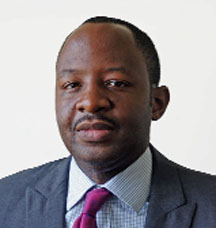– GT&T still committed
to competition
Both the Guyana Telephone and Telegraph Company (GT&T) and Digicel remain in the dark as to reason for government’s decision to postpone the formalization of arrangements for bringing into force legislation which would have effectively ushered in a liberalized telecommunications sector.
Digicel’s Chief Executive Officer Gregory Dean and his GT&T opposite number Yog Mahadeo told Stabroek Business earlier this week that they had not been formally notified as to the reason for the government’s decision not to press ahead with bringing an end to GT&T’s existing monopoly which had been the subject of negotiations prior to the passage of enabling legislation in the National Assembly earlier this year. Also, Mahadeo confirmed, there had been no contact between the Government of Guyana and GT&T’s parent company Atlantic Tele Network earlier this year.
In his interview with this newspaper Dean said Digicel was “still in the dark” as to the reason for what the company regards as a delay in introducing competition into the local telecommunications sector, despite having made a formal enquiry in a letter to the Prime Minister two weeks ago. “All parties have said that they want liberalization and a level playing field. We don’t see why there should be any delay,” Dean said adding that it was no secret that for Digicel, this latest unexpected development was “a major disappointment.” Dean said that Digicel was concerned that there now appeared to exist “no clear road map” for the way forward as far as progress towards liberalization was concerned. “We are one of the major shareholders in the sector and it is not unreasonable for us to want to have clarity on the situation,” Dean added.

Both sides, meanwhile, have declined to comment on reports that the government’s 11th-hour backing away from giving effect to liberalization legislation was triggered by the last-minute recognition that there might have been loopholes in the legislation that could lead to litigation; a consideration alluded to by Head of the Presidential Secretariat Dr Roger Luncheon a few weeks ago.
Asked to provide a company perspective on the current status of what has now become a controversy over the liberalization of the telecommunications sector, Mahadeo pointed to an interview given to this newspaper last year during which he said that both GT&T and its parent company ATN not only wanted to see liberalization go forward but wanted to “champion” it.

Dean, meanwhile, said that Digicel wanted the delay in the liberalization of the sector to be “as short as possible.” He said the quest for a change in the existing status quo had to do not so much with Digicel and GT&T as it had to do with creating a level playing field, ushering in “a competitive environment” and providing local consumers with “more affordable dialing”.
Dean told Stabroek Business that the issue of liberalization was about “putting consumers first” wondering aloud as to what could now “come out of the woodwork” given the fact that the parties had long committed themselves to liberalization.
Digicel has made no secret of the fact that its major post-liberalization priority would be to seek to secure a share of the overseas dialing market which, Dean said, will significantly reduce rates to customers. He said that while as a business entity the company was concerned about its return on investment, it now felt a measure of frustration over the fact that the absence of a liberalized environment hinders the company’s desire to do more. “We look at what Digicel is doing in the rest of the Caribbean and we realize that we are behind in terms of what we know we can offer,” Dean said.
In the past Mahadeo has rejected assertions that GT&T’s monopoly places the company in a position of overwhelming financial advantage, pointing out that the company continued to subsidize the low rates it charges for its local landline service out of the returns accruing from overseas dialing. During his interview with this newspaper earlier this week Mahadeo restated his concern that “perceptions” of the profitability of GT&T’s overseas dialing service should take account of its current and ongoing responsibility to the local landline service. “What is significant is that despite the pressures placed on our returns from the overseas by our local landline obligations we continue to do everything that we can to bring our overseas rates down. We did that last year and we are doing it again this year,” he said.
Mahadeo also alluded to Digicel’s public pronouncements regarding its priority interest in securing a share of the overseas dialing market and raised the question as to whether GT&T’s competitors in the sector were likely to show an interest in investing in the local landline service. While Dean has emphasized Digicel’s priority interest in the external market he has not ruled out the company’s involvement in the local landline service.
Mahadeo, meanwhile, has hinted, not for the first time, that the post-liberalization era could see an increase in local landline rates, since, he pointed out, under the terms of its contract with the Government of Guyana, GT&T would be compelled to maintain services which it currently provides even if these were to become unprofitable.





